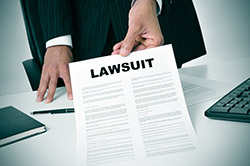|
|
Monday, January 18, 2016

The conversation about a person’s last wishes can be an awkward one for both the individual who is the topic of conversation and his or her loved ones. The end of someone’s life is not a topic anyone looks forward to discussing. It is, however, an important conversation that must be had so that the family understands the testator’s final wishes before he or she passes away. If a significant sum is being left to someone or some entity outside of the family, an explanation of this action may go a long way to avoiding a contested will. In a similar vein, if one heir is receiving a larger share of the estate than the others, it is prudent to have this action explained. If funds are being placed in a trust instead of given directly to the heirs, it makes sense for the testator to advise his or her loved ones in advance.
When a loved one dies, people are often in a state of emotional turmoil. Each deals with grief differently and, often, unpredictably. Anger is a common reaction to loss, one of the five stages postulated to apply to everyone dealing with such a tragedy. Simply by talking to loved ones ahead of time, a testator can preempt any anger misdirected at the estate plan and avoid an unnecessary dispute, be it a small family tiff or a prolonged legal battle.
The executor of the estate must be privy to a significant amount of information before a testator passes on. It is helpful for the executor to know that he or she has been chosen for this role and to have accepted the appointment in advance. The executor should know the location of the original will. Concerns of fraud mean that only the original copy of a will can be entered into probate. The executor should be aware of all bank accounts, assets, and debts in a testator’s name. This will avoid a tedious search for documents after the decedent passes on and will ensure that all assets are included as part of the estate. The executor of an estate should be aware of all memberships, because it will be the executor’s responsibility to cancel them. An up-to-date accounting of all assets and debts will simplify the settlement of the estate for an executor significantly.
Wednesday, December 30, 2015
50928948.jpg) When the courts are asked to determine liability in a personal injury case involving a traffic accident, one of the first things a jury is asked to consider is who is at fault for the accident. There are several factors that are taken into consideration when making that determination.
First and foremost, if any of the drivers involved in the accident were guilty of any traffic violation related to the accident, there is a good chance that the court will assign fault the driver guilty of the infraction. Common traffic violations related to traffic accidents include running red lights or stop signs, speeding, making improper turns, and texting while driving. Similarly, if any of the drivers is guilty of driving under the influence of drugs or alcohol, he or she is likely to be found at fault for the accident.
A police officer’s account of the accident is also important in determining which party is at fault. The police officer will interview witnesses, including the parties to the accident, and weigh conflicting stories to determine what actually happened to cause the accident. Tire marks on the road and the positioning of vehicles can help an officer come to a conclusion. Sometimes, video footage exists to eliminate any doubt as to what happened, either from someone’s dash cam or from a security camera. Police officers have experience and training to help them recreate accident scenes from the evidence available, but their reports are not perfect.
When an accident is the result of a rear end collision or a left hand turn, the officer is usually quick to assign blame to the car in the rear or the car turning left. The rule of thumb while driving is that the driver making a turn must wait for oncoming traffic to pass before turning. A driver must always cede the right of way to the traffic in front.
The role that the determination of fault plays depends largely on the laws of the state in which the accident occurs. Some states follow a doctrine of contributory negligence while some have a more lenient policy of comparative negligence. States that use contributory negligence may preclude a plaintiff from collecting any damages if his or her own negligence contributed to the accident at all. States that use a model of comparative negligence will reduce a jury’s award by the percentage of fault found to be the plaintiff’s. If a plaintiff has more than 50 percent fault, he or she cannot recover anything.
Friday, November 20, 2015

Automobile deductions: Whether an individual uses a personal vehicle for his or her own business or company owns a vehicle, the depreciation of value and costs associated with that vehicle may be deducted from the company’s income at year's end. A taxpayer must keep track of all of these expenses and document them by maintaining receipts and records of expenditures in order to claim the deduction. Alternatively, a business may declare standard deductions for the vehicle based on the mileage of the vehicle. In 2015, this standard deduction is 57.5 cents for every business mile driven. If a vehicle is driven for both business and personal use, the IRS will require a taxpayer to identify the percentage of use dedicated to business.
Capital expenses: Also called startup costs, the IRS allows a business to deduct up to $5,000from its income in its first year of expenses for expenditures made before the doors of the business opened. Any capital expenses remaining after the first $5,000may be deducted in equal increments over the next 15 years.
Legal and professional fees: Fees paid to professionals like lawyers, accountants, and consultants, may be deducted from a company’s income each year. If the benefit of a professional’s advice is spread out over a number of years, the tax deduction must also be spread equally over the same period. The cost of books or tuition for classes to help avoid legal or professional costs may also be deducted.
Bad debt: A business may deduct the losses suffered as a result of a customer who fails to make payment for goods sold. However, a business that deals in providing a service may not deduct the time devoted to a client or customer who does not pay. A service business may deduct expenses made in an attempt to help that customer or client.
Business entertaining:The cost of meals or entertainment purchased for business purposes must be documented by receipts in order to maintain the right to deduct the cost from income for tax purposes. Only 50percent of the total cost of entertainment expenses may be deducted.
Interest: If a business operates on a business loan or a line of credit, the interest on that loan may be deducted from income for tax purposes.
Normal business expenses: The cost of advertising, new equipment, depreciation of existing equipment, moving expenses, business cards, office supplies, travel expenses, coffee and beverages, software, casualty and theft losses, postage, business association dues, and all other business expenses can be deducted.
Wednesday, October 14, 2015

Estate planning is designed to fulfill the wishes of a person after his or her death. Problems can easily arise, however, if the estate plan contains unanswered questions that can no longer be resolved after the person's demise. This can, and frequently does, lead to costly litigation counter-productive to the goals of the estate. It is important that will be written in language that is clear and that the document has been well proofread because something as simple as a misplaced comma can significantly alter its meaning.
Planning for every possible contingency is a significant part of estate planning. Tragic scenarios in which an estate planner’s loved ones predecease him or her, though uncomfortable, must be considered during the preparation of a will to avoid otherwise unforeseen conflicts.
Even trained professionals can make significant mistakes if they are not well versed in estate planning. An attorney who practices general law, while perfectly capable of preparing simple wills, may not understand the intricacies of trusts and guardianships. A great many attorneys, not aware of the tax consequences of bequests involving IRAs, may leave heirs with unnecessary financial obligations. If an attorney is not knowledgeable enough to ask the proper questions, he or she will be unable to prepare an estate plan that functions efficiently and ensures the proper distribution of the estate's assets.
In spite of the wealth of an individual, the estate may be cash deficient if that wealth is tied up in assets at the time of the individual's death. Problems can also result if an estate planner has distributed assets into joint bank accounts or accounts with pay on death provisions. If the executor of the estate does not have access to funds to pay the estate's bills or taxes, the heirs of the estate may run into trouble.
Even if estate planning is handled well from a logistical point of view, lack of communication with loved ones can interfere with a will's desired execution. A tragedy that incapacitates the testator can occur suddenly, so it is imperative that a savvy estate planner confers with loved ones as soon as possible, making them aware of any future obligations, such as life insurance premiums that must be paid and informing them of the location of any probate documents and inventories of assets. Such conversations ensure that the individual's wishes will be carried out without complications or delay in the event of an unexpected incapacity.
In addition to communicating logistical information, it is also essential to schedule a personal conversation with loved ones that makes clear any sentimental bequests or large gifts that require explanation. This avoids the shock or discomfort that may arise after one's death during which a well-thought-out decision is questioned as impulsive or irrational. Such direct communication of one's plans avoids unnecessary envy, arguments or rivalry among family and friends.
Consulting with attorneys who specialize in estate planning is the cornerstone of creating a plan to ensure that one's desires are carried out and that all the bases are covered. Estate planning attorneys serve as invaluable repositories of all information necessary to strategizing a plan that not only meets one's personal needs and desires, but is legally binding.
Monday, September 28, 2015
 A person who slips or trips on another person’s property may be entitled to damages for resultant injuries. In order for a slip and fall to be compensable, there must have been an unsafe condition on the property. Unsafe conditions include icy accumulation, wet or slippery floors, badly damaged sidewalks and debris underfoot, among many others.
In addition to the existence of unsafe conditions, in order for the injury to be compensable, the owner must have known that the dangerous condition existed and allowed it to persist.This is the most difficult element for a victim in a slip and fall case to prove. Sometimes, the owner of the property causes the dangerous condition, such as when the floors of a department store are freshly mopped and slippery. At other times, the danger is not caused by the owner, but is obviously apparent, as is the case after a snowstorm. The owner of the property is entitled to a grace period to correct dangerous conditions. But, while the problem is being fixed, the owner should put up a notice to warn individuals of the possible danger. Yellow boards are commonly used to warn of wet floors, and orange cones are often used to warn of ongoing construction.
If the dangerous condition is obvious enough to a casual observer, it may not be compensable since an individual has a duty to use a reasonable degree of care for his or her own safety. Even if the owner is at fault, if the injury is no more severe than a bruise or a slight sprain, a lawsuit is probably not the best course of action. Lawsuits are usually reserved for more serious injuries like broken bones or spinal damage. Only an experienced attorney can advise the individual involved in a slip and fall incident as to whether the case is strong enough to warrant a claim.
Friday, August 28, 2015

Before transferring your home to your children, there are several issues that should be considered. Some are tax-related issues and some are none-tax issues that can have grave consequences on your livelihood.
The first thing to keep in mind is that the current federal estate tax exemption is currently over $5 million and thus it is likely that you may not have an estate tax issue anyway. If you are married you and your spouse can double that exemption to over $10 million. So, make sure the federal estate tax is truly an issue for you before proceeding.
Second, if you gift the home to your kids now they will legally be the owners. If they get sued or divorced, a creditor or an ex- in-law may end up with an interest in the house and could evict you. Also, if a child dies before you, that child’s interest may pass to his or her spouse or child who may want the house sold so they can simply get their money.
Third, if you give the kids the house now, their income tax basis will be the same as yours is (the value at which you purchased it) and thus when the house is later sold they may have to pay a significant capital gains tax on the difference. On the other hand if you pass it to them at death their basis gets stepped-up to the value of the home at your death, which will reduce or eliminate the capital gains tax the children will pay.
Fourth, if you gift the house now you likely will lose some property tax exemptions such as the homestead exemption because that exemption is normally only available for owner-occupied homes.
Fifth, you will still have to report the gift on a gift tax return and the value of the home will reduce your estate tax exemption available at death, though any future appreciation will be removed from your taxable estate.
Finally, there may be more efficient ways to do this through the use of a special qualified personal residence trust. Given the multitude of tax and practical issues involved, it would be best to seek the advice of an estate planning attorney before making any transfers of your property.
Wednesday, July 29, 2015

There are a number of issues that can come up in a personal injury case. Every personal injury case will include a claim for compensatory damages, meant to compensate the plaintiff for any loss. It is important to include all claims that apply in a lawsuit because, if one is omitted, there is no second chance to reopen the case. Some of the most common types of compensatory damages include:
Property damage: If personal or real property is damaged as a result of an action of the defendant, the plaintiff can include a claim for property damage.
Medical costs: Any out of pocket medical bills should be reimbursed as part of a lawsuit. If an insurance company paid medical bills, they may assert a right to be reimbursed out of the proceeds of any personal injury settlement.
Pain and suffering: This is meant to address the physical, mental, and emotional anguish that comes with being the victim of an accident. In many cases, the path to rehabilitation and recovery is difficult, painful, and frustrating. A victim should be compensated, at least in part, for the interruption of their lives.
Permanent injury: Often, despite the doctors’ best efforts, a patient is left with permanent pain or the loss of function of a body part after treatment is complete. Even though it is impossible to assess the value of this monetarily, the courts will try their best to put a number on it and compensate plaintiffs accordingly.
Lost wages: A claim for lost wages seeks to recover money for any work that was missed as a result of an injury. The lost work may have occurred immediately after the accident, or may have accrued over a period of time, including any days missed to receive treatment.
Loss of consortium: After a serious injury, many aspects of a victim’s life change. If his or her ability to be intimate with a spouse is affected, a claim of loss of consortium may be included in the complaint. It does not matter if the problem is a physical one or a psychological one.
Tuesday, June 23, 2015
 Have you ever watched the TV show Disaster DIY on HGTV? The premise of the show is that many people have no idea what they are doing when it comes to home remodeling, but they try the “do it yourself” (DIY) approach anyway. The host of the show then comes in to save the day, repairing what the DIYers have messed up, and teaching them how to do perform certain tasks. Have you ever watched the TV show Disaster DIY on HGTV? The premise of the show is that many people have no idea what they are doing when it comes to home remodeling, but they try the “do it yourself” (DIY) approach anyway. The host of the show then comes in to save the day, repairing what the DIYers have messed up, and teaching them how to do perform certain tasks.
This show has many parallels to the world of business law. It is tempting to try and find a DIY solution to legal issues. Budgets are tight, and professional legal advice can seem like a luxury when you are first starting out or struggling to meet quarterly goals, so many businesses adopt a DIY solution when what they really need is a good lawyer.
The Internet also encourages many businesses to DIY their legal issues, whether its access to legal info or various forms. But the problem is that advice on the Internet is not always accurate, particularly since business law is different in every state.
After pursuing the DIY route and disaster ensues, business owners are forced to call in the professionals to clean up the mess. Unlike the TV show, where the show’s producers cover the DIYers costs, the costs of fixing a legal DIY disaster rest solely on the business or the business owner. It often costs businesses significantly more to rework a legal framework that wasn’t carefully thought through. There are two reasons for this. First, proactive legal help is always going to be more cost effective than legal triage; it’s infinitely more costly to actively fight a pending lawsuit than it does to carefully draft and implement needed policies. Second, the results that even the best attorney can salvage from an awful situation are not likely to be as as ideal or as cheap as it would have been to avoid the disaster altogether.
Monday, May 18, 2015

Many of us have been lucky enough to acquire timeshares for the purposes of vacationing on our time off. Some of us would like to leave these assets to our loved ones. If you have a time share, you might be able to leave it to your heirs in a number of different ways.
One way of leaving your timeshare to a beneficiary after your death is to modify your will or revocable trust. The modification should include a specific section in the document that describes the time share and makes a specific bequest to the designated heir or heirs. After your death, the executor or trustee will be the one that handles the documents needed to transfer title to your heir. If the time share is outside your state of residence and is an actual real estate interest, meaning that you have a deed giving you title to a certain number of weeks, a probate in the state where the time share is located, called ancillary probate, may be necessary. Whether ancillary probate is needed will depend upon the value of the time share and the state law.
Another way you could accomplish this goal is to execute what is called a "transfer on death" deed. However, not all states have legislation that permits this so it is imperative that you check state law or consult with an attorney in the state where the time share is located. A transfer on death deed is basically like a beneficiary designation for a piece of real estate. Your beneficiary would submit a survivorship affidavit after your death to prove that you have died. Once this document is recorded the beneficiary would become the title owner.
It is also important to investigate what documents the time share company requires in order to leave your interest to a third party. They may require that additional forms be completed so that they can bill the beneficiary for the annual maintenance fees or other charges once you have died.
If you want to do your best to ensure that your loved ones inherit your time share, you should consult with an experienced estate planning attorney today.
Monday, April 20, 2015
9735.jpg) A solid homeowners insurance policy can provide peace of mind about securing one of your most valuable assets. Unfortunately, many homeowners don’t fully grasp what exactly is covered under that policy, and most importantly, what isn’t. A solid homeowners insurance policy can provide peace of mind about securing one of your most valuable assets. Unfortunately, many homeowners don’t fully grasp what exactly is covered under that policy, and most importantly, what isn’t.
Homeowners insurance policies generally cover your home itself and other physical structures on the property. Your personal belongings also fall under most policies, along with property damage and bodily injury sustained by you or others on your property. You, your spouse and children, and any guests, tenants, or employees in your home can all be covered under this policy, just be sure to check when you purchase the policy.
Sounds like they’ve got you covered, right? Not so fast; there are a number of possible perils that are often not covered under basic homeowners insurance. Knowing what falls into this category can save you a lot of time and trauma if you ever experience one of these situations in the future.
The two main exceptions are earthquake and flood damage. The impacts of these natural disasters would not be covered by your standard policy. Earthquake insurance and coverage for some types of water damage can often be purchased as an addendum, but flood insurance must be purchased on its own as a separate policy.
Further, standard policies don’t cover damages to your building as a result of your failure to perform regular maintenance on your property. Insect, bird, or rodent damage, rust, mold, and any kind of wear and tear on your property is typically not covered. Neither are hidden defects, mechanical breakdowns, or food spoilage in the event of a power outage. Though there is no current concern for this, damage caused by war or nuclear exposure is also not covered.
Some things have minimal coverage built into your standard policy, for which you can purchase additional coverage as an addendum. Valuable property, including firearms, jewelry, silverware, etc., is usually covered by a standard $1,000. Insurance for replacement value of lost or damaged property is usually determined on an itemized basis that takes depreciation into account. You can expand this coverage by paying to remove depreciation from consideration. Liability coverage can be increased if desired as well.
These should serve as general guidelines for your homeowners insurance, but be sure to consider the details on your specific policy. It’s important to consider exactly what you have covered in order to determine what additional types of insurance you may want to purchase.
Monday, March 16, 2015

There are many reasons for retaining tax records. They can be a useful guide for business planning, for tracking receipts and expenses, and in cases where the company or shares are being sold to outside parties.
The IRS expects taxpayers to keep records for as long as they are needed to administer any part of the Internal Revenue Code. In other words, if you fail to keep records, and an item in a past return is questioned, you may not have the documentation you need to defend yourself and avoid taxes and penalties. In addition, insurance companies and creditors may wish to see tax returns even after the IRS no longer does.
What is the "Period of Limitations" for a Tax Return?
Generally, you must keep records that support income and deductions for a tax return until the "period of limitations" for that return elapses. This is the period during which you can still amend your return to get a refund or credit and during which the IRS can still assess more tax. It varies depending on the circumstances surrounding each return.
- If you owe additional tax, but you haven't seriously underpaid, committed fraud, or failed to file a return, the period is 3 years from the date taxes were filed.
- If you failed to report income that you should have reported, in excess of 25% of the gross income that you did report, the period is 6 years.
- If you filed a claim for credit or refund after you filed your return, the period is the later of 3 years after the return was filed or 2 years after tax was paid.
- If you filed a claim for a loss from worthless securities or a bad debt deduction, the period is 7 years.
- If you filed a fraudulent return or failed to file a return, the period is unlimited.
Note: Returns filed before taxes are due are treated as though they were filed on the due date.
Other Periods of Limitations
Additionally, if you are an employer, you must keep employee tax records for at least 4 years after the later of the date the tax becomes due or the date it is paid.
For assets, you should keep records until the period of limitations elapses for the year in which you sell the property in a taxable transaction. You will need records to compute depreciation, amortization, or depletion deductions and to add up your basis in the property for purposes of calculating gain or loss. A business law attorney experienced in tax matters can further guide you in relation to your specific situation
|
|
|
|